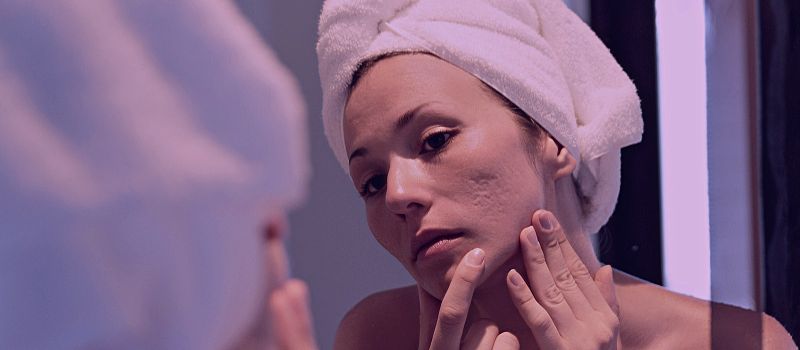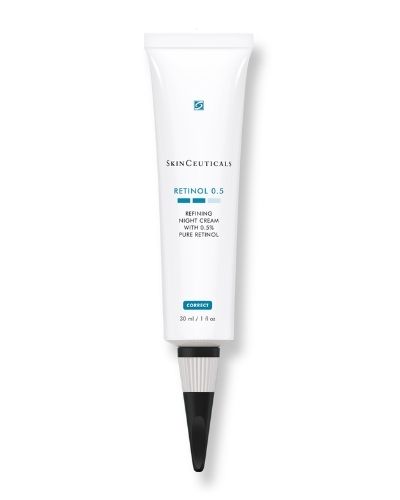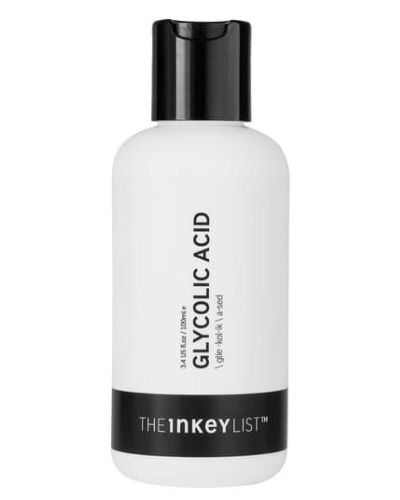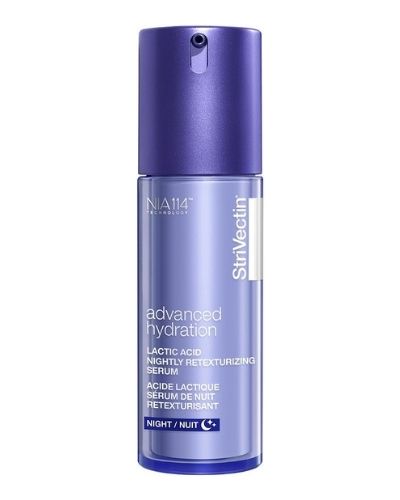Acne can come and go, but the scars it leaves behind can last for weeks and even months without showing any signs of improvement.
Scars are the aftermath of inflammation, and since acne is an inflammatory condition, scars will always follow every pimple that you get.
Acne scars can manifest themselves as dark, red, or discolored spots, but they oftentimes go much deeper than the superficial layer of the skin and appear as uneven texture.
And while professional treatments such as chemical peels, microneedling, and lasers are probably the best thing that you can invest in to fight scarring, you may very well help improve the concern by using over-the-counter topical products.
Here are the best ingredients for acne scars.

Niacinamide
Niacinamide or vitamin B3 is a great ingredient for fading hyperpigmentation, reducing post-acne redness, and even improving skin texture.
But besides being effective for acne scars, niacinamide is also one of the gentlest anti-inflammatory and anti-acne ingredients.
Niacinamide can help reduce or completely prevent acne in some cases by inhibiting lipids in our sebaceous glands that contribute to acne formation while at the same time increasing ceramides which help the skin maintain optimal hydration levels.
This leads us to one of the most useful properties of niacinamide, which is the ability to improve epidermal barrier function by reducing trans-epidermal moisture loss and increasing the skin’s resistance to potentially harmful pathogens.
Once your skin barrier is strengthened, your skin will be more hydrated and will have an easier time dealing with other issues such as redness and sensitivity, but it will also be more resistant to irritation and inflammatory conditions such as acne and rosacea.
This is even better than actually fighting acne scars because it prevents them from forming in the first place, which is why niacinamide is a great ingredient to have in your daily skincare routine.
Vitamin C
Vitamin C is another great skincare ingredient that helps reduce UV damage on the skin, even out the skin tone, and brighten the complexion.
Vitamin C is a powerful antioxidant that inhibits melanogenesis, which is the process by which the brown pigment melanin is produced by melanocyte cells in the deepest layer of the epidermis.
This means that vitamin C can stop uneven melanin deposition and not only fade existing hyperpigmentation but also prevent darker patches and spots from forming in the first place.
Additionally, vitamin C can boost the body’s production of ceramides and other essential lipids for our skin’s health, resulting in softer skin, refined texture, a strengthened skin barrier, and a beautiful, healthy glow.
Vitamin A (Retinol)

Vitamin A derivatives found in topical skincare products are one of the best ingredients you can use to improve post-acne scarring.
Retinol speeds up cellular turnover, making pigmented spots shed faster and making room for new and healthy skin cells underneath.
But besides being an excellent pigment inhibitor, retinol can also improve those pesky red spots known as post-inflammatory erythema that usually show up on lighter skin tones after a pimple has healed and are notoriously difficult to get rid of.
Lastly, depending on the strength, retinol can also help with textured scarring, and while it may not completely get rid of ice pick, rolling, or boxcar scars, it can definitely improve their appearance after prolonged use.
Hydroquinone
Hydroquinone is one of the most powerful melanin-inhibitors in the market that works by neutralizing the activity of melanocyte cells and making them stop producing excess melanin that would lead to hyperpigmentation.
By controlling melanocyte function, hydroquinone helps your skin become brighter, more even, and free from stubborn pigmented patches or spots.
And while some believe that hydroquinone works only for dark skin, this ingredient can help everyone who is dealing with stubborn hyperpigmentation, regardless of skin color.
However, with that said, hydroquinone can be irritating for more sensitive skin, and it’s definitely an ingredient you want to be careful with.
One of the most important things you need to do when using hydroquinone is to be extra diligent with your sunscreen application, as this ingredient can make your skin extremely sensitive to the sun.
Glycolic Acid

Glycolic acid is an exfoliating acid that belongs to the family of alpha-hydroxy acids (AHAs).
This ingredient works on the surface of the skin to gently dissolve the proteins that hold dead skin cells together and help them shed naturally.
Glycolic acid is a small molecule, which makes it the strongest and fastest-working alpha hydroxy acid of the bunch, and although it’s generally well-tolerated, it’s the one ingredient that’s likely to cause some irritation at first, especially if used in high concentrations.
On the other hand, glycolic acid is amazing for getting rid of hyperpigmentation as it helps the damaged and pigmented cells shed quicker than they normally would.
Glycolic acid isn’t the best ingredient for post-inflammatory redness, but it can help improve texture.
Kojic Acid
Kojic acid is another great ingredient for hyperpigmentation, and it’s usually found in soaps and serums alongside other brightening ingredients such as tranexamic acid.
Kojic acid works in a simple way where it blocks tyrosinase, which is the enzyme that forms the brown pigment melanin in the deeper layers of your epidermis.
Tyrosinase works by converting the amino acid tyrosine into melanin.
Because of its ability to penetrate the layers of your skin, kojic acid blocks this process by sitting in the active site of tyrosinase, leaving no space for the amino acid tyrosine.
Kojic acid is usually sought out as a spot-fading or pigmentation and melasma treatment as it is a somewhat less aggressive option to hydroquinone which makes it a better option for sensitive skins.
Lactic Acid

Lactic acid is an exfoliating acid that belongs to alpha-hydroxy acids (AHAs).
This ingredient is derived from sour milk or sugar-rich foods, and it’s a water-soluble substance that possesses larger molecules, making it slightly different than other AHAs, for example, glycolic acid.
Due to its large molecules, lactic acid won’t penetrate deeper into the skin and will instead work on the surface, which means it will provide lighter exfoliation, making it more suitable for sensitive skins.
Lactic acid is milder than other AHAs, and it can also be used alongside other actives as it is usually very well tolerated by all skin types.
Some benefits of using lactic acid include smoother and more uniform complexion, improved hyperpigmentation, evened out skin tone, refined texture, and of course, healthy and glowing skin.
How Long Will it Take to Fade Acne Scars?
Depending on which skincare ingredient you use and the severity of your scars, it can take anywhere from a few weeks to several months and even years in some cases for acne scars to fully fade away.
This is why it’s a good idea to invest in professional treatments such as chemical peels, microneedling, IPL, and lasers, as these will give you faster results that you can then continue to maintain with over-the-counter topical products.
Which Skincare Ingredient Works The Best For Acne Scars?
The best skincare ingredient for fading acne scars are definitely vitamin A derivatives, particularly retinol and retinoic acid (tretinoin), which work by speeding up cellular turnover and helping the skin appear clear, refined, and evened out.
Tretinoin, although effective, is definitely something you need to do your research on before you start using it because it comes with a few initial side effects, including shedding, peeling, redness, irritation, and purging.
I have a post about how tretinoin works and how to use it properly, so make sure to read that for more information.

My name is Simone and I am a certified skin specialist. I created this website to teach my readers how to take great care of their skin and I also like to occasionally share my honest opinions on skincare products I’ve tried. You can learn more about me here.
